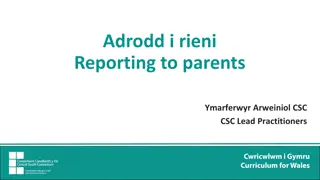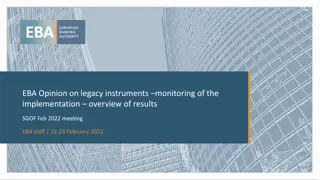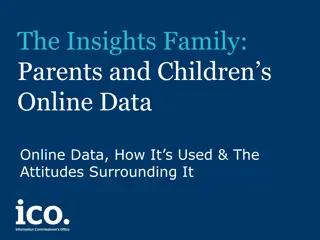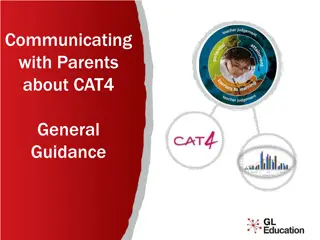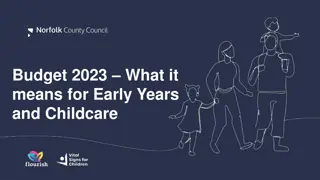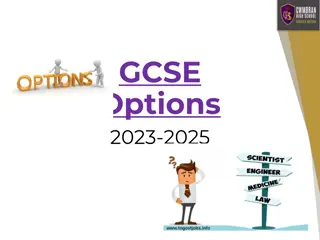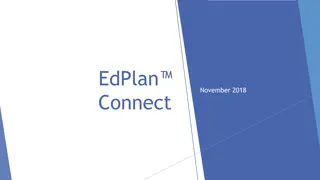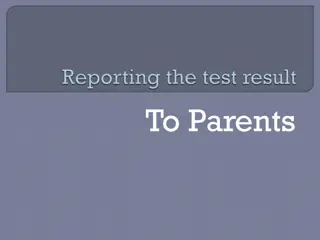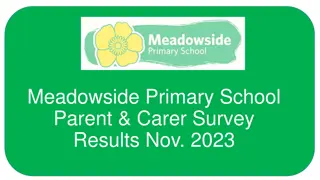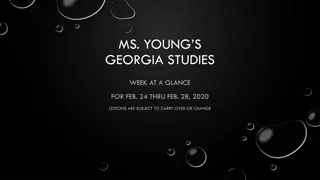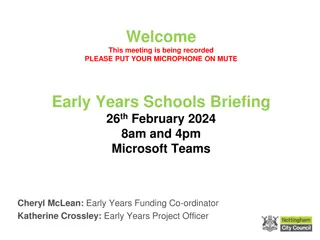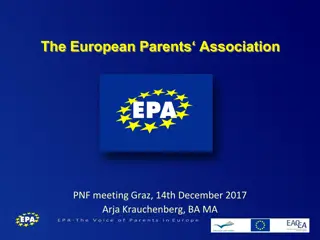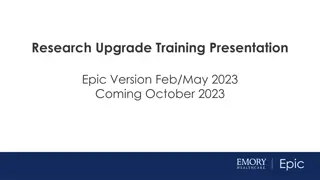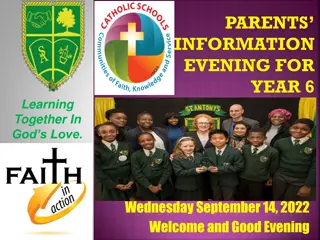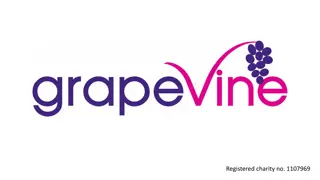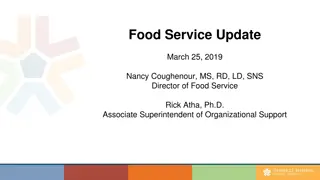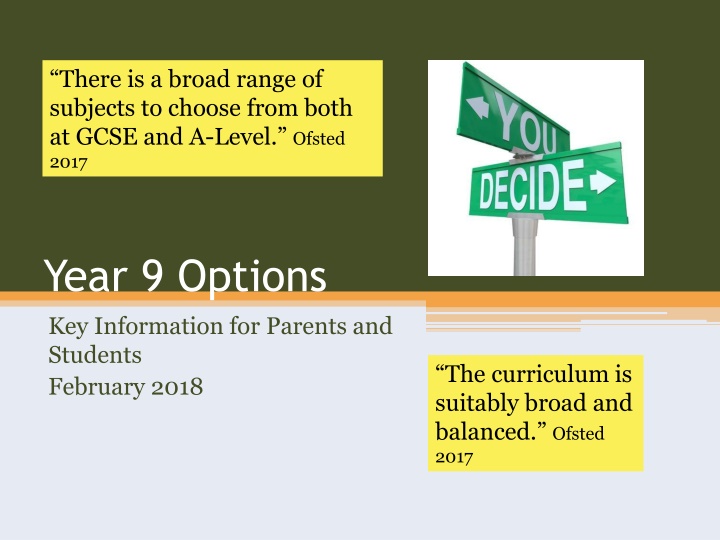
Choosing GCSE Options: Subjects, Process, and Offer Tailoring
Explore the range of subjects available for GCSE students, understand the process of choosing options, and learn how the curriculum is tailored to different needs. From compulsory subjects to elective choices, get insights on the GCSE selection process.
Download Presentation

Please find below an Image/Link to download the presentation.
The content on the website is provided AS IS for your information and personal use only. It may not be sold, licensed, or shared on other websites without obtaining consent from the author. If you encounter any issues during the download, it is possible that the publisher has removed the file from their server.
You are allowed to download the files provided on this website for personal or commercial use, subject to the condition that they are used lawfully. All files are the property of their respective owners.
The content on the website is provided AS IS for your information and personal use only. It may not be sold, licensed, or shared on other websites without obtaining consent from the author.
E N D
Presentation Transcript
There is a broad range of subjects to choose from both at GCSE and A-Level. Ofsted 2017 Year 9 Options Key Information for Parents and Students February 2018 The curriculum is suitably broad and balanced. Ofsted 2017
Aims of this evening 1. Provide an overview of the Year 9 Options Process 2.Introduce you to the core curriculum and curriculum options for September 2018 3.Provide you with the opportunity to circulate and talk with subject leaders and teachers about their different subjects and courses
Which subjects do students have to take for GCSE? English Language English Literature Maths (Maths or separate GCSEs in Maths and Statistics teacher decides which) Science Triple Science (3 GCSEs) or Combined Science (2 GCSEs) (teacher decides which)
How many options do students have? There are 3 options.
How is the offer tailored to different needs? Students taking Triple Science and Statistics will take 10 GCSEs: Eng Eng Lit Maths Stats Phys Chem Biol Opt 1 Opt 2 Opt 3 Students doing Combined Science and Statistics will take 9: Eng Eng Lit Maths Stats Sci 1 Sci 2 Opt 1 Opt 2 Opt 3 Everyone else will study 8: Eng Eng Lit Maths Sci 1 Sci 2 Opt 1 Opt 2 Opt 3
What are the option choices? GCSE: Art and Design, Business Studies, Computing, Product Design, Food Tech, Dance, Drama, French, Spanish, Geography, History, Music, Photography, PE, Psychology, RE Other qualifications: LIBF in Financial Education, NCFE Music Technology, BTEC Music, IT
Can students choose anything they like? They have to choose one of French, Spanish, Geography, History. This is the compulsory option. Then they have two more options of their choice (which can also come from the compulsory options) Note there may be some entry requirements so they have to get a particular Step in a subject in order to do it for GCSE. Triple Science is teacher-selected Note it is not possible to start a new language in Year 10.
Whats the EBacc? The EBacc is a performance measure used to judge schools. EBacc subjects are the core academic subjects that make up the EBacc and are most regularly asked for by college and university courses . You don t need to have studied all of these to go to university, but having your GCSE mix steered towards EBacc subjects will help keep your options open. The Ebacc consists of 1 subject from each of the 5 areas below: Area English Maths Subjects English, English Literature Maths Combined Science, Triple Science (Biology, Chemistry or Physics), Computer Science History, Geography French, German, Spanish etc. Science Humanities Languages
Additional option We are exploring the possibility of offering an additional option subject outside of the main curriculum* to students with excellent attendance, punctuality and attitude to learning. Please indicate on the options form if you would be interested in this * One lesson before school and 2 after school each week. This going ahead is dependent on a number of factors.
H9G H9G Joe Joe Bloggs Bloggs
How should students choose? DO Think about what you enjoy and what you are good at Think about the combination of subjects Consider what you might want to do in the future Speak to your teachers in school and at Options Evening. Read up about GCSEs in the options booklet DON T Make choices based on whether you like your teacher you may not get the same one and it s the subject content and skills which are important Choose something because you think it will be easy all GCSEs are challenging in their own way https://www.youtube.com/watch?v=DsLfs sAa1OY (Donna)
When is the deadline? Students must hand in their completed Options Form to Student Services by: Friday 2nd March 2018 First come, first served submit as soon as possible!
When do students find out their choices? In the summer term Can they change their mind? Students must see Ms Swift or Mr German if they wish to change an option choice. Try to make an informed decision now!
What next? Discuss at home which subjects your son enjoys and is good at and his plans for the future Have discussions with teachers and older students about the options choices https://www.youtube.com/watch?v=d_ssJ V_XfjQ


